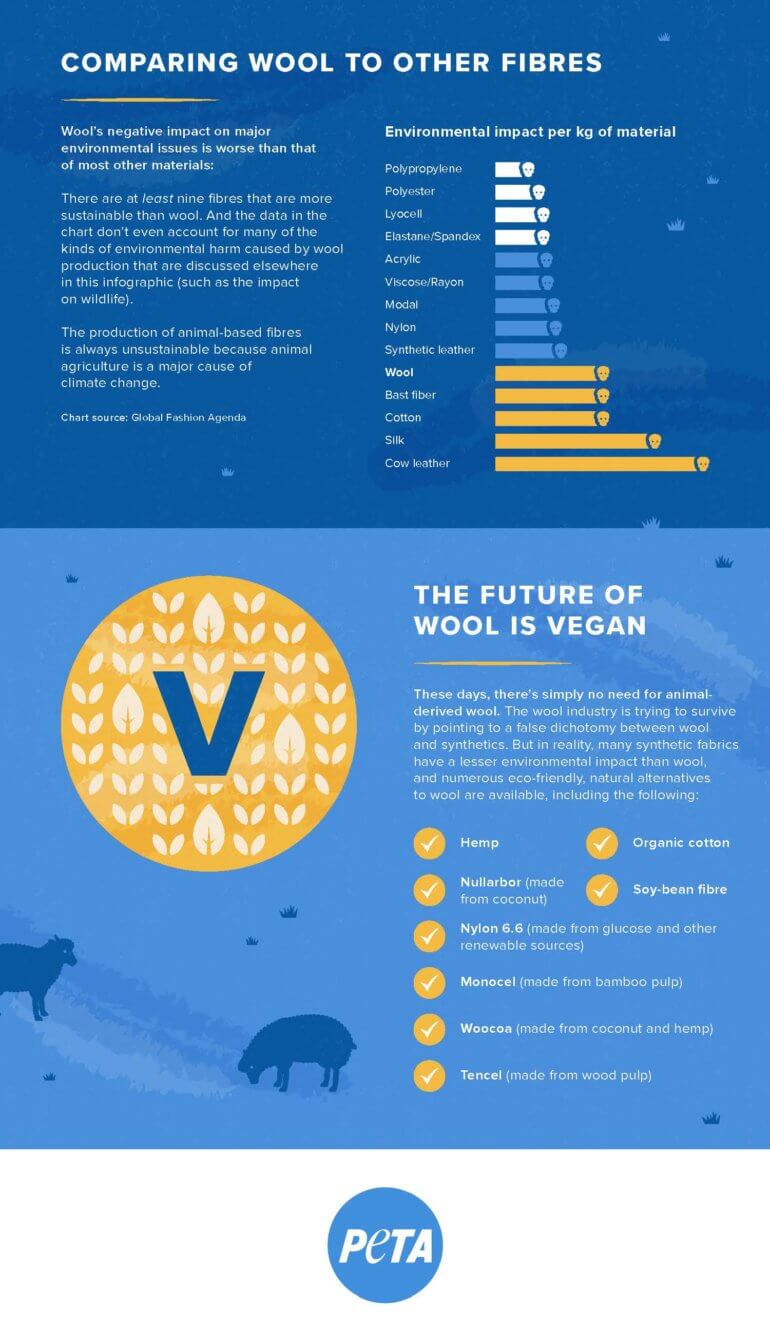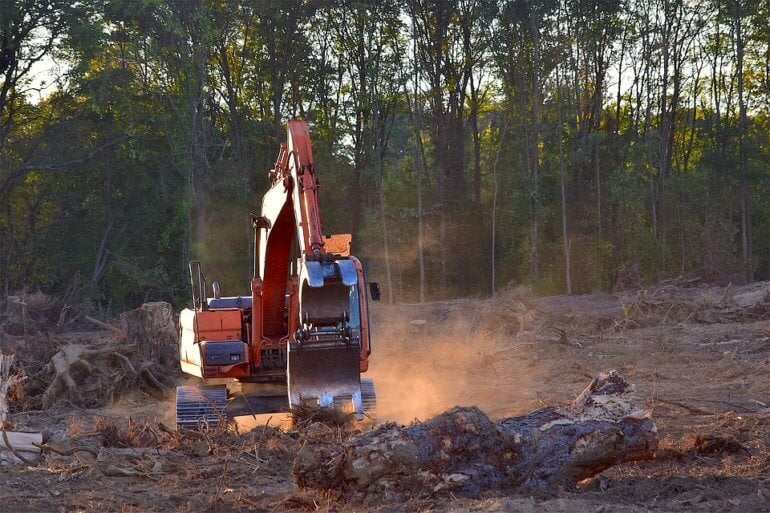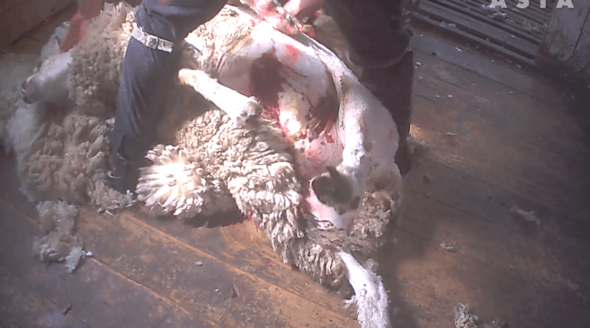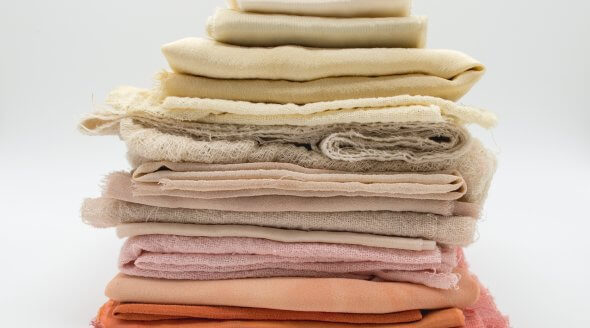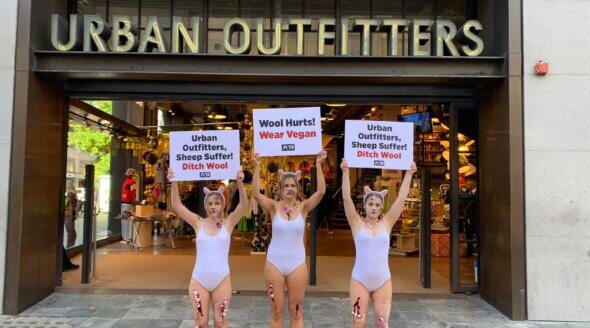A Campaign to Greenwash Wool Gets Aired Out by PETA
You might have spotted the latest campaign by Woolmark on billboards or bus stops around London. The misleading ads play off the “natural” credentials of wool as if that makes it a planet-friendly alternative to synthetic fabrics, but it fails to acknowledge wool’s damaging impact on the environment and massive role in the ongoing climate catastrophe – not to mention the sheep who are subjected to a life of suffering to produce it.
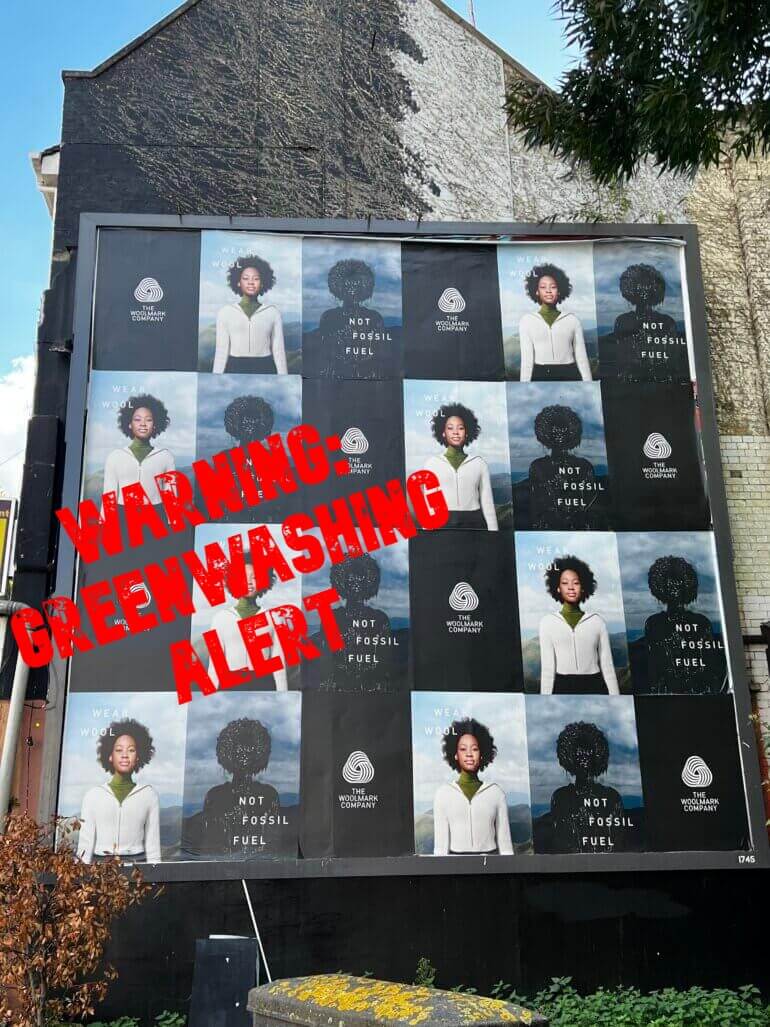
Here’s why you should stay away from wool and choose genuinely sustainable materials if you want to prevent animal abuse and care about the environment. It’s time to ask yourself, “What is the real impact of my wardrobe?”
Wool Isn’t Green – It’s Just Greenwashed
Wool production is a nightmare for the planet. According to the “Pulse of the Fashion Industry” report, it’s one of the five most environmentally damaging materials.
Similarly, the Made-By Environmental Benchmark for Fibres ranks wool as a “Class E” material, the worst category possible, based on its greenhouse gas emissions, human toxicity, eco-toxicity, and energy, water, and land use.
Our Planet Is Burning Up for Woolly Jumpers
Sheep eat a lot – and as they digest their food, gases build up inside their intestines that must be expelled. So they burp and fart a lot, too, releasing enormous amounts of methane gas into the atmosphere. Raising unnaturally large populations of ruminant animals for human ends – the UK’s vast sheep population is over 30 million – has been identified as a major contributor to the climate catastrophe. One sheep can produce about 30 litres of methane each day. That’s a lot of emissions in your woolly scarf.
What About the Land Needed to Raise Millions of Sheep?
Since wool is one of the lucrative co-products of the unsustainable meat industry, it is hardly surprising that land has been cleared and trees have been cut down to make room for grazing sheep, which has led to erosion, increased soil salinity, and decreased biodiversity.
More land for sheep means less land for other animals. In England and Wales, farming has stripped almost the entire upland area of wildlife such as eagles and mountain hares.
Then Comes the Issue of Waste…
It all has to go somewhere, and the manure from sheep farming is polluting our land, air, and water, causing eutrophication, a serious ecological problem that occurs when run-off waste causes excessive plant growth in water systems. This suffocates animals by depleting oxygen levels in the water and is the leading cause of “dead zones”.
Sheep “dip” (a commonly used insecticide/fungicide) is highly toxic and presents a major pollution risk. In 1995, it killed 1,200 fish in Scotland after a farmer dumped it into a stream.
Wool Is the Dark Side
Despite the Woolmark campaign propaganda suggesting otherwise, the wool industry is dark and deadly.
The production of all wool – no matter where it originates or what “ethical” or “responsibly sourced” claims are made on the label – spells extreme suffering and a terrifying death for millions of sheep and lambs.
Since 2014, PETA entities have documented cruelty to sheep at 117 wool industry facilities in Australia, Europe, North America, and South America.
In England, workers kicked, punched, and stamped on sheep’s heads and jabbed them in the face with sharp metal clippers, leaving huge gashes on their bodies that were later crudely sewn up with a needle and thread – and no painkillers whatsoever.
And it’s not just the shearing process that’s cruel. Also often without painkillers, farmers use knives, hot irons, or tight clamps to sever parts of the animals’ bodies. The ears of lambs who are just a few weeks old are hole-punched, and their tails are cut off .
Don’t Let Them Pull the Wool Over Your Eyes
Luckily, there’s no need to buy wool or other animal-derived materials. Campaigns like Woolmark’s would have you believe in a false dichotomy between synthetics and wool, and that simply isn’t true.
In reality, many synthetic fabrics have a smaller environmental impact than wool.
But there are also many soft and sustainable natural vegan fabrics, like hemp, organic cotton, bamboo, soya-bean fibre, Nullarbor (made from coconut), Woocoa (made from coconut and hemp), Tencel (made from wood pulp), and more! Many clothing brands are now opting to use them instead of wool:
YOU Can Make a Difference!
We’re calling on Urban Outfitters to be true to its commitment to sustainability and ethical standards by selling only animal-friendly vegan fabrics, which it already stocks. Will you join us?

